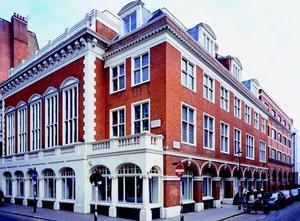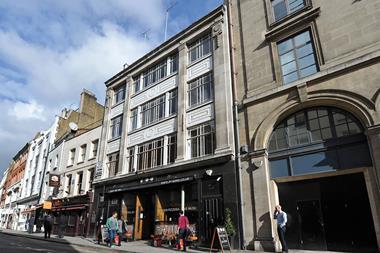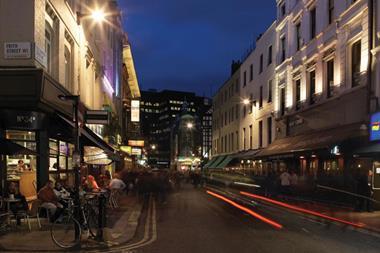Hannah Brenton reports on a new approach to affordable housing in central London
In the crammed and winding back alleys of Soho in central London, sites for affordable housing schemes are hard to come by. So says Soho Estates, which argues that finding a building where affordable housing can coincide with a large development is nigh on impossible in the area. Instead the estate, the empire of the late soft-porn publisher Paul Raymond, is in talks with Westminster City Council about an affordable housing ‘credit’.
Philip Thompson, Soho Estates investment and development director, says there have been informal discussions surrounding “forward-delivering” affordable housing units. The units would serve as a credit against schemes coming through in the future, such as the redevelopment of Walker’s Court and the Foyles store on Charing Cross Road.
“If you are an existing landholder - be it us, or Shaftesbury, or anyone of that ilk - if one of our buildings becomes vacant we would like to be in a position to say ‘the best thing for us to do now is provide affordable housing in this building’. But we need recognition that we’re doing this, so that when we come to do one of our other developments we don’t incur huge affordable housing-in-lieu payments or be asked to build it elsewhere,” Thompson says.
Discussions with Westminster are thought to centre on the redevelopment of 37 Dean Street from a tired office building into key worker affordable housing units. Informal conversations are taking place with planning officers and politicians but there has yet to be a formal approach.
“When you build 100,000 sq ft of offices you’re supposed to build 100,000 sq ft of residential and you’re supposed to have a proportion of that as affordable housing. Where are you supposed to build this? There are no brownfield sites, there are no greenfield sites - certainly in Soho and central London,” Thompson says.
“The wider picture is we have a number of schemes that will come to fruition in the next five-to-seven years in Soho, which will throw up an affordable housing requirement. Therefore we’re looking ahead in our business to say we will have this issue to resolve in three years’ time or five years’ time, but there may not be an opportunity to resolve it then.”
Thompson will not confirm the building involved, but says Soho Estates have identified a particular site where affordable housing would be appropriate and could be developed immediately.
“Westminster are receptive to it but there’s a long way to go,” he adds. “It has met with universal approval as an embryonic idea. But it hasn’t got further than that.”
There is precedent for an affordable housing ‘credit’ to be applied to future schemes. Land Securities was obliged to provide residential as part of its office redevelopments in Victoria. The real estate investment trust built Wilton Plaza - a mix of affordable, student and private housing - as a credit.
Under the agreement with the council, the affordable units could be used as a credit against future developments within the borough.
However, the future schemes would need to pass planning tests in their own right to justify off-site affordable housing.
Stephen Ashworth, partner at law firm Dentons, says the mechanism could in principle be used broadly by developers, but there would be issues applying it across different London boroughs.
“It could conceivably work in London if you get something like the mayor operating as a bank and saying ‘yes we will accept these as credits’ and allow people to transfer across, but you’ve got a bit of difficulty around the new homes bonus.”
He says there would need to be a financial equivalence test for different areas of London, for instance in high-value Mayfair.
A Westminster City Council spokesman said: “We welcome any flexibility which will help create more affordable homes in central London for people that really need them.”






























No comments yet